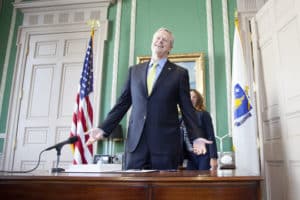
Gov. Charlie Baker gestures to reporters as he sits down to sign the state's fiscal year 2023 budget on July 28, 2022. State House News Service photo
Gov. Charlie Baker still doesn’t know what to do about his agita.
Under a sweeping clean energy and climate bill lawmakers returned to his desk, 10 cities and towns would have the ability to restrict or prohibit the use of fossil fuels in single-family, multifamily, retail and office construction or major renovation projects. Labs and medical projects are exempted. Proponents say the pilot program is necessary to create a proving ground for green building techniques.
And now, one day from his deadline to act, his proposed changes to the bill already adopted or rejected and his departure from office nearing, Baker must determine exactly how much discomfort he is willing to accept.
“That part of the bill gives me agita,” Baker said Tuesday. “One of the big decisions we have to make is whether my concerns about that particular piece, which cut at something I think everybody would agree is a very significant problem here in Massachusetts, overwhelm the rest of the good the bill does or not.”
Baker told reporters he continues to review the bill (H.5060), which would overhaul how Massachusetts supports the growing offshore wind industry, spur a transition to renewable energy sources and widespread use of electric vehicles, and move toward the state’s net-zero emissions by 2050 target.
‘Exclusionary Zoning’ His Major Concern
Lawmakers spent months crafting the final proposal in private negotiations, which Baker returned with a suite of amendments, including a proposal to inject $750 million in American Rescue Plan Act spending into the bill and additional restrictions on the fossil-free local options that would allow the program to take effect only when the electrical grid reaches a certain capacity.
The state legislature adopted some but not all of the changes he sought and sent the final product back to Baker on July 31, the final day for formal business in the two-year session.
“I’ve expressed deep concerns about what I view as the exclusionary zoning provisions involving those 10 towns,” Baker said. “We know that exclusionary zoning, which has been a fact of life in Massachusetts for decades, has made it really hard and harder and harder every year for low-income and moderate-income people to find a place that they can afford to live.”
A veto from Baker would essentially kill the bill because lawmakers, who waited until the final weeks of formal lawmaking sessions to finish the bill, plan to meet for the remainder of the term only in informal sessions where they cannot take the roll call votes necessary for an override.
Whether he chooses to sign the bill or spike it, Baker will not get another pass at crafting substantial climate legislation before he leaves office in January. That puts him on somewhat different footing than at the end of the last two-year legislative session, when he vetoed a bill setting the net-zero by 2050 target and worked with lawmakers in the first few months of the current term to find common ground.
A new poll commissioned by the Boston-based Barr Foundation says 62 percent of Massachusetts voters think climate change is either a “crisis” or a “very serious issue,” with another 23 percent saying it’s “somewhat serious.”
More than 30 bills remain on Baker’s desk following the flurry of action leading up to, on and hours after July 31, including an $11.3 billion infrastructure bond bill with action due Wednesday and prominent bills due Thursday dealing with mental health care access, cannabis industry regulations, legal sports betting and a judiciary technology bond bill that updates gun laws in response to a recent U.S. Supreme Court decision.
State House News Service staff writer Colin A. Young contributed to this report.






